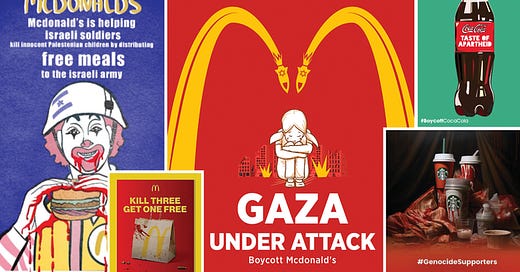New Generation of Protesters aim Fury at Corporate Profiteers of Imperialism
In response to the genocide in Palestine, activists are making their voices heard by boycotting American franchises like McDonald's and Starbucks.
In a striking act of defiance, a man stormed into a McDonald's restaurant in Istanbul, upending a box of mice onto the restaurant floor. His indignant exclamation echoed through the establishment: "Don't eat the meat of Muslims, eat these mice instead." The act was in protest to Israel's offensive against Gaza, but more profoundly, it was a potent symbol of resistance against the discreet puppeteers of modern imperialism — the global corporate powers.
This unidentified protester understood something critical that many of us often overlook: it is not merely the political class that perpetuates the cycles of violence and exploitation. Behind the scenes, these cycles are often facilitated, if not driven, by private corporate power. His act of defiance was not aimed at the powerless political class, but at one of the many multinational corporations that indirectly benefit from imperialism and its brutalities.
Let us not forget that McDonald's, like many other global corporations, has a significant stake in the imperialist order. This stake doesn't always materialize in obvious ways. While McDonald's may not directly invest in weapons or wage wars, its sprawling global presence, from Istanbul to Tel Aviv, is contingent on an international economic order that privileges the powerful and marginalizes the weak. This order, undergirded by imperialism, enables corporations like McDonald's to exploit cheap labor in the Global South, pillage natural resources, and sell their products in a global market that is often rigged in their favor.
The incident in Istanbul was not an isolated event. Just last week, in Birmingham, UK, a similar protest took place when a man released dozens of live rodents dyed in the colors of the Palestinian flag in a McDonald's outlet. This act, much like the one in Istanbul, represents a growing recognition of the critical role that multinational corporations play in global power dynamics.
It is important here to note that the issue is not with McDonald's per se, but rather with the larger system of global corporate power that it represents. This system, driven by profit and unencumbered by morality, is indifferent to the human cost of its actions. As long as the profits keep rolling in, the suffering of the people in Gaza or the exploitation of workers in the Global South are merely collateral damage.
The protester in Istanbul, in one audacious act, managed to expose this harsh reality. His act serves as a reminder that our fight for justice and equality should not just be aimed at the political class, but also the corporate elites who often operate in the shadows. It is they who reap the benefits while ordinary people, from Istanbul to Gaza, bear the brunt of their ruthless pursuit of profit.
In a world teetering on the edge of chaos, it is acts like these that shine a light on the true power structures that govern our world. As we stand at this critical juncture, we must ask ourselves: will we continue to let corporate power dictate the terms of our existence, or will we rise up, like the protester in Istanbul, and demand a world free of exploitation and injustice?
The choice is ours to make:




